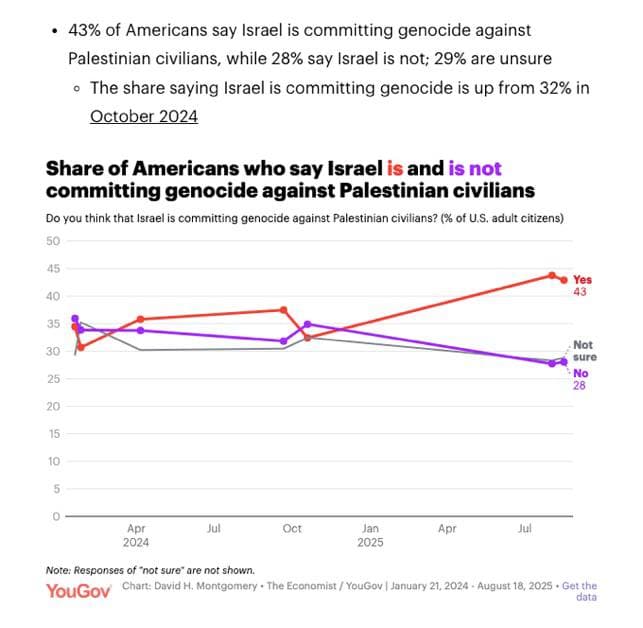In a striking shift in public sentiment, a recent YouGov poll indicates that a majority of Americans now perceive Israel"s actions in the ongoing conflict with the Palestinians as genocidal. This perspective is particularly prevalent among younger demographics and Democratic voters, suggesting a significant change in how U.S. citizens view Israeli policies and military operations.
Majority Perception of Genocide
The YouGov poll, conducted earlier this month, reveals that approximately 56% of Americans believe Israel"s military actions in Gaza constitute genocide against the Palestinian people. This figure represents a substantial increase from previous surveys conducted prior to the current hostilities. Notably, among voters aged 18-29, the percentage rises to an alarming 71%, underscoring a generational divide in opinions regarding the Israel-Palestine conflict.
Democrats, traditionally more supportive of Palestinian rights, show a stark contrast to Republican views, with 68% of Democratic respondents labeling Israeli actions as genocidal compared to just 32% of Republicans. This polarization reflects broader trends in U.S. political alignments and public opinion regarding foreign policy, particularly in the Middle East.
Implications for U.S.-Israel Relations
This evolving perception of Israel"s military strategy may have profound implications for U.S.-Israel relations. Historically, the United States has been a staunch ally of Israel, providing substantial military and financial support. However, as public opinion shifts, political leaders may face mounting pressure to reassess their positions. Analysts suggest that as the conflict continues, particularly with reports indicating high civilian casualties—recently, leaked data revealed that 83% of Gaza deaths are civilians by 2025—support for Israel may further wane among the American populace.
Political commentators warn that if these trends persist, they could lead to significant changes in U.S. foreign policy, with potential repercussions for aid packages and diplomatic support. The growing sentiment against perceived injustices could catalyze a more balanced approach to the Israeli-Palestinian conflict, advocating for Palestinian rights alongside Israel"s security concerns.
Future Developments and Actions
As the situation in the region remains fluid, it is crucial to monitor how these changing perceptions influence both domestic politics and international relations. The Biden administration is expected to navigate this increasingly complex landscape carefully, balancing longstanding alliances with emerging public sentiments. Recent developments, including discussions around U.S. military aid to Israel and potential humanitarian assistance to Gaza, will be pivotal in shaping future policies.
The ongoing conflict and its portrayal in American media are likely to continue driving public opinion. Activism and advocacy efforts are expected to intensify, particularly among younger voters who are increasingly vocal about their views on social justice and human rights. As previously reported, the implications of this shifting sentiment could lead to a reevaluation of how the United States engages with both Israel and Palestine in the years to come.


![[Video] Heavy clashes and gunfire reported in Baghdad, Iraq](/_next/image?url=%2Fapi%2Fimage%2Fthumbnails%2Fthumbnail-1768342239932-848qsh-thumbnail.jpg&w=3840&q=75)




![[Video] Gunfire between Iraqi security forces and Sadr militias in Baghdad](/_next/image?url=%2Fapi%2Fimage%2Fthumbnails%2Fthumbnail-1768343508874-4redb-thumbnail.jpg&w=3840&q=75)
